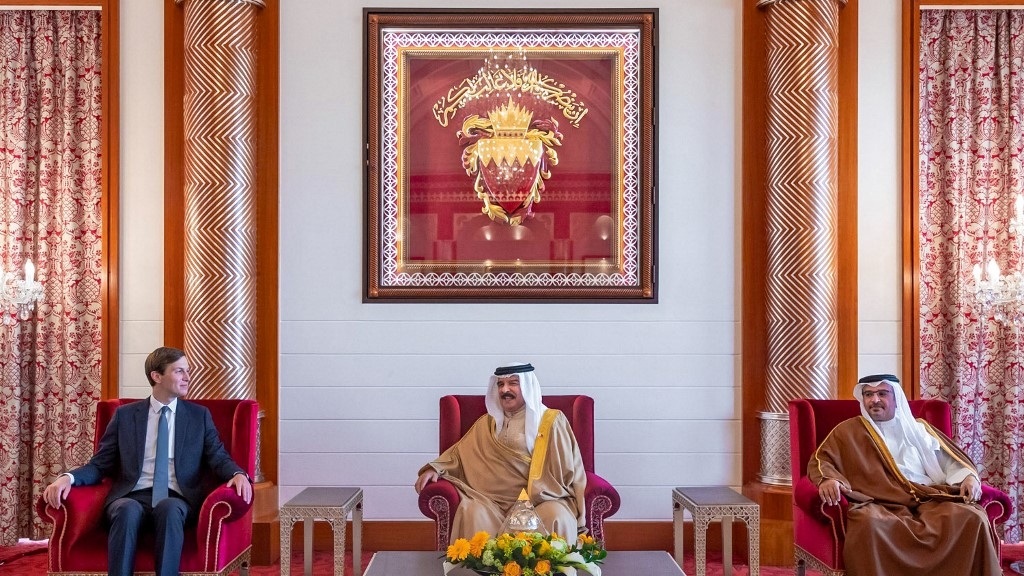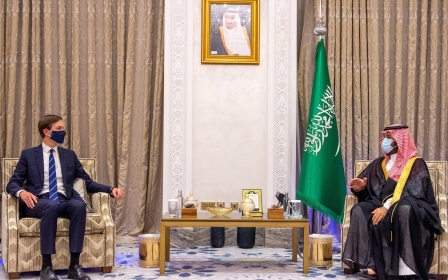Bahrain to allow flights between Israel and UAE to cross its airspace

Bahrain has followed Saudi Arabia in announcing that it will allow all flights from the United Arab Emirates (UAE) to cross its airspace, in an apparent sign that Israeli flights will be allowed to fly over the Gulf kingdom.
"All flights to and from the UAE can use Bahrain airspace," the state news agency reported late on Thursday, citing the aviation authority, without mentioning Israel.
The decision would reduce the flying time between the Middle East states by several hours.
Israel and the UAE announced last month a controversial deal to normalise ties, a step that has been denounced by Palestinians as an act of betrayal.
The two countries are expected to sign the US-brokered accord, Israel's first with a Gulf nation and only its third with an Arab state, at the White House in coming weeks.
Under the accord, Israel agreed to suspend its planned annexations in the occupied West Bank - but Israeli Prime Minister Benjamin Netanyahu has insisted the plans remain on the table.
On Wednesday, Saudi Arabia said it will allow flights between Israel and the UAE to cross its airspace, a move hailed as a “tremendous breakthrough” by Netanyahu.
Netanyahu said that the ability of Israeli planes to fly directly to the UAE would boost the Israeli economy by reducing the cost and duration of flights and enhancing the tourism sector.
Kushner tour
On Monday, Israel's El Al flew through Saudi airspace carrying US and Israeli delegations from Tel Aviv to Abu Dhabi, the first official flight by an Israeli carrier over the kingdom. The return flight also used Saudi airspace.
After accompanying the Israeli delegation to Abu Dhabi, White House adviser Jared Kushner set off on a tour of other Gulf capitals on Tuesday, looking for more Arab support.
He held meetings in Bahrain, Saudi Arabia and then Qatar.
Last week, during a visit by US Secretary of State Mike Pompeo, Bahrain said it was committed to the creation of a Palestinian state.
Following Pompeo's departure, King Hamad bin Isa Al Khalifa was quoted as saying that he had told the secretary of state that his country remains committed to the Arab Peace Initiative, which calls for Israel's complete withdrawal from the Palestinian territories occupied after 1967, in exchange for peace and the full normalisation of relations.
No consultation
Israel and the US have said they are pushing more Arab countries to follow the UAE's path. Israel's intelligence minister has mentioned Bahrain as a possible candidate.
Bahrain was among the first countries in the world to welcome the UAE deal without reservations.
Along with Bahrain, Oman is predicted by Israel to follow in Abu Dhabi's footsteps.
Regional heavyweight Saudi Arabia, while not condemning the deal, has refused to normalise ties until Israel signs an internationally recognised peace accord with the Palestinians.
Senior Emirati diplomat Anwar Gargash last month said the UAE did not consult with its allies before the deal was made public by the White House.
Middle East Eye delivers independent and unrivalled coverage and analysis of the Middle East, North Africa and beyond. To learn more about republishing this content and the associated fees, please fill out this form. More about MEE can be found here.






